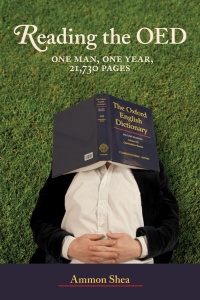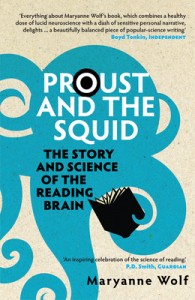CONTAINER 1: GUIDE TO THE DICTIONARY
The dictionary was once an audio book in this library. In 1983, the National Library Service recorded The Concise Heritage Dictionary. It was recorded on 56 sound cassettes and was distributed in 5 containers. According to one of our resident librarians, the cassettes didn’t circulate, but were available in the library as part of the reference collection. Can you imagine fast forwarding and rewinding to get to the word that you wanted to find out? What if you didn’t exactly know how to spell it?
The Concise Heritage Dictionary has not yet been converted to digital and is not yet available on BARD, but it is on its way. Which is what I had to tell a disappointed library patron this week, who called up asking for it. The patron told me that they used to spend time reading the dictionary, and now, because they had lost their sight, were interested in listening to it. Can you imagine being that interested in words?
In his book Reading the OED: One Man, One Year, 21,730 Pages (DB67925), Ammon Shea records the year that he spent reading the entireOxford English Dictionary. From this radio interview from NPR, I learned that a “vocabularian” is a person who pays too much attention to words. Ammon Shea is decidedly a vocabularian, but what about the library patron? What about me? If I’m more prone to learning some business speak from Small Message, Big Impact: The Elevator Speech Effect, or learning about brain science inProust and the Squid, do I still get to be a vocabularian?
Reading the OED: One Man, One Year, 21730 Pages
by Ammon Shea
DB 67925
A self-proclaimed collector of words describes his yearlong reading of the “Oxford English Dictionary”. He comments on words that he believes others would like to know about, such as “sympatetic,” which is a companion one walks with, and “onomatomania,” which means vexation at having difficulty finding the right word. 2008.
by Ammon Shea
DB 67925

A self-proclaimed collector of words describes his yearlong reading of the “Oxford English Dictionary”. He comments on words that he believes others would like to know about, such as “sympatetic,” which is a companion one walks with, and “onomatomania,” which means vexation at having difficulty finding the right word. 2008.
Small Message, Big Impact: The Elevator Speech Effect
by Terri Sjodin
DB 75418
Speaking consultant shares techniques for creating a short sales pitch, otherwise known as the “elevator speech,” intended to earn more presentation time. Discusses outlining and condensing your message, using a natural voice, and practicing and evaluating delivery. 2012.
by Terri Sjodin
DB 75418
Speaking consultant shares techniques for creating a short sales pitch, otherwise known as the “elevator speech,” intended to earn more presentation time. Discusses outlining and condensing your message, using a natural voice, and practicing and evaluating delivery. 2012.
 Proust and the Squid: The Story and Science of the Reading Brain
Proust and the Squid: The Story and Science of the Reading Brainby Maryanne Wolf
DB 67928
Discusses the evolution of our human brain’s capacity to learn to read. Begins with the origins of writing, proceeds to the development of the reading brain and its pathways to acquisition, and ends with questions about potential transformations due to digital technology. Examines reading difficulties of children with dyslexia. 2007.

No comments:
Post a Comment